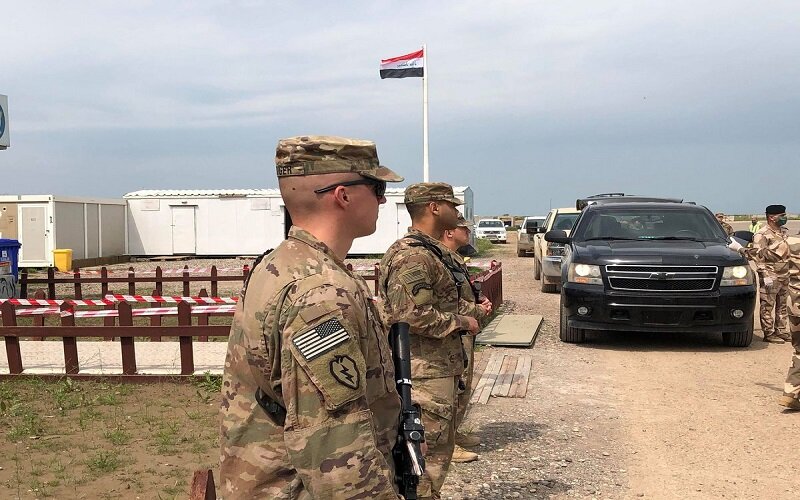Mohammad Baqer Sedaghat, in an interview with the website of the Strategic Council on Foreign Relations, referred to the Baghdad-Washington Memorandum of Understanding on the withdrawal of US combat and operational forces from Iraq by the end of 2021 and the change in the nature of the country’s operations from combat to training and said: What the Iraqi parliament wanted was like the withdrawal of US troops from Afghanistan, but what happened on the ground was just a change in the cover of the US presence in Iraq.
He added: Their cover was previously in the form of fighting ISIS. Given the defeat of the ISIS, even if the Iraqi parliament did not pass such a resolution, the Americans had to change their cover to continue their presence in Iraq. Therefore, as the pro-resistance forces in Iraq declare, this practice is merely a play with words, and as this process continues, the US presence in Iraq will neither diminish nor end.
The expert on Iraq affairs noted: Even the New York Times, referring to the memorandum of understanding between the two countries, called the US action a “diplomatic show” because the American presence in Iraq will continue. In fact, the Americans have so far not accepted to leave Iraq.
Explaining the domestic political scene in Iraq, Sedaghat said that one of the influential components of the country’s stance on the US presence was the result of the October 10 parliamentary elections, adding: Although it is a bit difficult to predict the results in this period, it seems that there will be no significant change in the result compared to the 2018 elections.
According to the analyst of Iraq affairs, in this situation, if the US presence in Iraq remains at the current level, not only the operations carried out by the Axis of Resistance and its opponents will continue, but it will also increase.
He stressed: Of course, we must take into account the desire of many political groups fir the continuation of the presence of US forces, because in the special session of the Iraqi parliament, which approved the withdrawal of US troops, only 170 delegates out of 329 attended the session. A large number of Sunni and Kurdish representatives in the country opposed the passage of the resolution, and later made great efforts to repeal it.
Referring to the reasons for the non-implementation of the Iraqi parliament resolution and the opposition of some political groups, the researcher of the Mersad Think-tank explained: Apparently, some opponents of the US presence in Iraq have also come to the conclusion that complete US withdrawal from Iraq, as happened in Afghanistan, is impossible and that they will see the US presence in the future.
Sedaghat said: Of course, after this resolution, some people raised the issue that the Iraqi parliament does not have the status to approve such a resolution, because this issue must be raised through government bills. On the other hand, the proponents considered legislation to be one of the duties of the parliament and considered this decree binding on the government. But overall, the inefficiencies in the Iraqi system have meant that even if we consider the Iraqi parliament to have the necessary capacity to pass that law, we will not see its implementation in practice.
He added: Some political groups in Iraq want to use the United States as a barrier to the so-called greater influence of Iran in the social, political and economic spheres of Iraq; but they ignore the difference between Iran’s influence and the US presence in the country, ignoring the many commonalities and long borders between the two countries.
The expert continued: This is while the US presence in Iraq is an occupation and there are no such broad cultural commonalities between the two countries. It should not be forgotten that the Iraqi civil war of 2006-2008 and the occupation of large parts of it by the ISIS were the result of the occupation of Iraq and the green light given to some Iraqi politicians by the United States.
Sedaghat continued: Even now, the United States wants the Iraqis to consider them as guarantors of their security, so if the US presence decreases, there is a possibility of increasing insecurity with the US green light.
The analyst of Iraq affairs continued: Groups in favor of the US presence in Iraq see the country as a gateway to industrialized countries and believe that Western countries are willing to operate in Iraq under the guise of the US presence in Iraq. Of course, this has been rejected by the recent serious presence of France in Iraq and their interactions with the Baghdad authorities, and some Western countries are looking to reduce the presence of American forces in Iraq in order to open the space for themselves.
He explained: In fact, supporters of the US presence in Iraq think that with the withdrawal of that country, conditions similar to those created in Afghanistan will emerge and armed groups or the similar ones will gain power in Iraq; but there is a major difference between Iraq and Afghanistan. Iraq, with its loyal combat force, has the necessary experience and facilities to fight those groups.
Sedaghat added: After the presence of Shiite groups in power, Sunni groups felt deprived of the political scene, and this made them welcome the arrival of ISIS forces; however, given that the areas inhabited by them were occupied by the ISIS as a result of which they suffered a lot of damage, we will not see a repeat of the movement to occupy Iraq, and such movements will not be welcomed by the people.










0 Comments